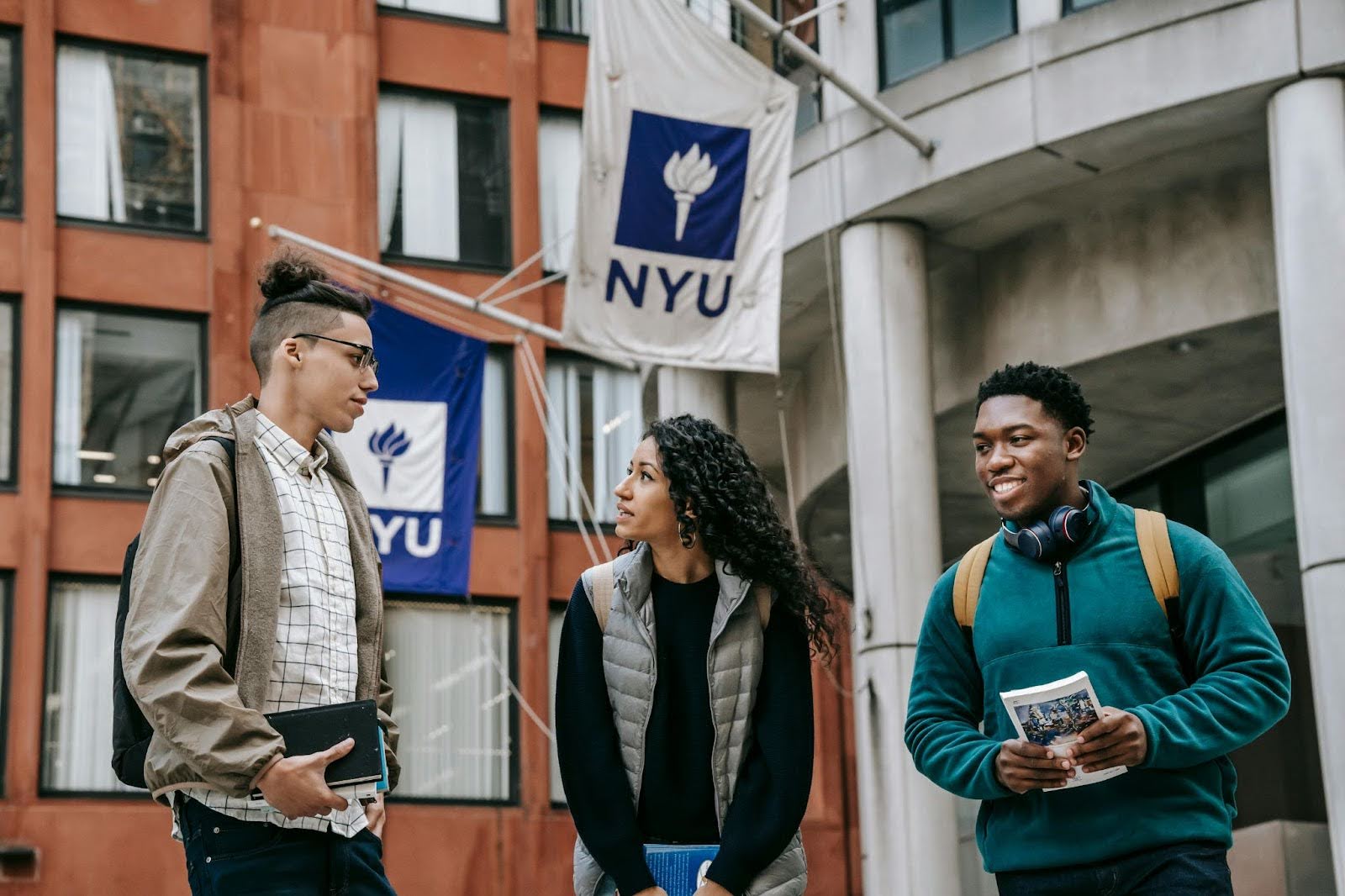

Blogs
10 Ways to Study Abroad: A Guide to Global Educational Opportunities

Over a million Indian students are studying abroad. This shows a significant trend in global education mobility. The desire to study abroad remains strong despite a 15% decline from the previous year. Students seek quality education, global exposure, and enhanced career opportunities. The journey to study abroad can be complex. Challenges range from visa regulations and financial concerns to cultural adaptation and accommodation issues.
How to study abroad? The pathway involves understanding various routes that connect students to international educational institutions. The study abroad process encompasses researching destinations. It includes selecting programs. It involves securing funding and obtaining visas. Council for American Education (CAE) has established a powerful brand presence in the study abroad consultancy space. CAE has over 34 years of specialized expertise in study abroad counseling. The organization has guided more than 25,000 Indian students to success at prestigious universities worldwide. CAE provides comprehensive end-to-end services. These range from test preparation to visa counseling.
Understanding the Value of Studying Abroad
You should understand the value proposition before jumping into how to go abroad for the studies process. Studying abroad offers more than just academic knowledge. You'll gain cultural immersion. You'll create global networking opportunities. You'll experience personal growth. These can significantly enhance your career prospects.
1. Research and Choose Your Destination
Your first step in the study abroad process should focus on selecting the right destination. Consider academic reputation in your field of interest. Look at language requirements. Evaluate cost of education and living. Research post-graduation work opportunities. Assess cultural fit and safety.
Traditional destinations like the US, UK, Canada, and Australia remain popular. Emerging options like Germany, France, New Zealand, and parts of Asia offer quality education. They often have potentially lower costs. Germany has seen Indian student enrollment increase. This is partly due to minimal tuition fees at public universities. Strong engineering programs also contribute to this trend.
University rankings matter. You should also consider the overall experience. Alignment with your career goals is important. Germany might be ideal for engineering enthusiasts. This is especially true for those focused on automotive engineering. Film studies might be better pursued in the US or UK.
2. Identify Programs and Universities
You'll need to research specific programs and universities after narrowing down potential destinations. They should align with your academic and career goals. Consider program structure and curriculum. Look at faculty expertise and research opportunities. Evaluate internship and practical training components. Assess alumni network and career services. Check accreditation and global recognition.
Resources like university websites can help you gather information. Education fairs provide valuable insights. Online platforms offer comprehensive details. Many universities offer virtual tours. Information sessions can help you get a feel for the campus environment without traveling.
Creating a shortlist of 5-8 institutions makes sense. These should meet your criteria. Include ambitious "reach" schools. Add more accessible options where you have a higher likelihood of acceptance.
3. Understand Admission Requirements
Each country and university has specific admission requirements for international students. Common requirements include academic transcripts and degrees. They may require standardized test scores (GRE, GMAT, SAT, ACT). English proficiency tests (TOEFL, IELTS) are often mandatory. A statement of purpose or personal essays may be needed. Letters of recommendation are typically required. Some creative programs ask for a portfolio. A resume or CV might be necessary.
Application deadlines typically fall 6-12 months before the program start date. Paying close attention to them is crucial. For fall (September/October) admissions, applications generally open from January/February. They close around June/July.
Your academic qualifications must meet the minimum requirements. For undergraduate programs, your secondary education completion (12th grade) must align with the required grades. This alignment is necessary for your chosen program.
4. Secure Funding and Financial Planning
Financing your education represents one of the biggest challenges in the study abroad process. You'll need a comprehensive financial plan. It should include tuition fees. Living expenses (accommodation, food, transportation) must be calculated. Health insurance is mandatory. Travel costs should be budgeted. Visa fees need to be included. Emergency funds are essential.
Various funding options exist. Scholarships (university-specific, government, and private) can help. Education loans are available. Family support might be an option. Part-time work opportunities exist where permitted by visa regulations. Assistantships and fellowships are available for graduate students.
Some countries like Germany and Norway offer minimal or no tuition fees. You'll still need to cover living expenses. Scholarships can significantly reduce financial burden. Competition for full scholarships remains intense. Researching and applying for multiple funding sources maximizes your chances of securing financial support.
5. Prepare and Submit Applications
You'll need to prepare and submit your applications after completing research and creating a funding plan. Attention to detail and organization matter greatly at this stage. Creating a timeline for each application helps track deadlines. Preparing standardized test scores well in advance is necessary. Drafting compelling personal statements highlights your unique qualities. It shows your fit with the program. Requesting recommendation letters from professors or employers who know you well adds credibility. Organizing academic transcripts and having them translated if necessary ensures completeness. Completing online application forms carefully prevents errors.
Some countries have a two-step application process. One is for university admission. Another is for the specific program. Following instructions carefully improves your chances of acceptance. Submitting all required documents in the requested format is essential.
6. Apply for Student Visa
Applying for a student visa becomes your next crucial step after receiving an acceptance letter. Visa requirements vary by country. They typically include an acceptance letter from the university. Proof of financial resources to cover tuition and living expenses is required. Health insurance documentation must be provided. A passport valid for the duration of your stay is necessary. Visa application forms need to be completed. Visa application fees must be paid. Medical examination results might be needed. Biometric information is often collected.
Starting the visa application process immediately after receiving your acceptance letter makes sense. Processing times can range from a few weeks to several months. Country-specific visa requirements need meticulous preparation. This helps avoid delays or rejection.
7. Arrange Accommodation
Securing suitable accommodation presents a significant concern for international students. Options include university dormitories or residence halls. Private student housing is available. Shared apartments offer affordability. Homestays with local families provide cultural immersion.
University accommodation often works best for first-year students. It provides easy access to campus facilities. It offers built-in social networks. Applying early matters. Spaces are limited. They are often allocated on a first-come, first-served basis.
Off-campus housing requires careful neighborhood research. Consider safety factors. Proximity to campus is important. Public transportation access makes commuting easier. Cost considerations affect your budget. Many universities offer housing assistance services for international students. These services help with the accommodation process.
8. Prepare for Cultural Transition
Cultural adaptation ranks among the most challenging aspects of studying abroad. Preparation helps through learning about the local culture. Understanding customs and etiquette is important. Developing basic language skills helps in non-English speaking countries. Connecting with current international students provides insights. Alumni from your home country can offer valuable advice. Joining pre-departure orientation programs familiarizes you with expectations. Researching practical aspects like weather helps with packing. Knowledge about clothing needs ensures comfort. Understanding local transportation facilitates mobility.
Culture shock typically follows a U-curve pattern. Initial excitement comes first. Frustration and homesickness follow. Adaptation and integration eventually develop. Universities typically offer counseling services. International student support helps with this transition.
9. Plan for Arrival and Orientation
Proper arrival planning ensures a smooth start to your international education journey. Booking flights well in advance is recommended. Aim to arrive a few days before orientation. Arranging airport pickup if offered by the university reduces stress. Packing essentials while adhering to airline baggage restrictions prevents issues. Carrying important documents in your hand luggage ensures safety. These include passport, visa, acceptance letter, and accommodation details. Having local currency for immediate expenses is practical. Purchasing a local SIM card enables communication. Arranging for international roaming is an alternative. Registering for orientation programs familiarizes you with campus resources. It helps you meet fellow students.
Most universities offer comprehensive orientation programs. These are specifically designed for international students. They cover academic expectations. Campus resources are explained. Health services information is provided. Cultural adjustment strategies are discussed.
10. Maximize Your Study Abroad Experience
You should focus on maximizing your international education experience once settled in. Engaging actively in academic activities enriches learning. Extracurricular involvement builds skills. Building a diverse social network creates connections. Include local and international students in your circle. Exploring internship opportunities provides practical experience. Research opportunities enhance academic growth. Traveling exposes you to new places. Experiencing the local culture deepens understanding. Developing language skills helps in non-English speaking countries. Utilizing career services prepares you for post-graduation opportunities. Maintaining academic performance ensures program completion. Balancing exploration and experiences creates a fulfilling journey.
Participating in exchange programs during breaks expands your global perspective. Study tours to other countries offer additional exposure. Documenting your experiences through photos preserves memories. Journals or blogs help reflect on your growth. Sharing with others spreads knowledge.
How Council for American Education (CAE) Helps You Study Abroad
CAE's personalized approach ensures each student receives individualized attention. This attention is tailored to unique needs and aspirations. Expert counselors help you navigate every step of the study abroad process. Services include university selection based on your academic profile. Application support makes the process smoother. Visa guidance increases success rates. Book a free counseling session today. Transform your educational aspirations into a successful international academic journey.
Ready to start your journey?
???? +91‑9999771444 | +91‑9999057555 ???? WhatsApp CAE
Key Takeaways
→ Your study abroad process begins with thorough research on destinations, programs, and funding options that align with your academic and career goals.
→ Preparation is crucial: start early, organize documentation, meet application deadlines, and develop a comprehensive financial plan.
→ Cultural adaptation is as important as academic preparation; research local customs and connect with current international students.
→ Visa applications require meticulous attention to detail and should be started immediately after receiving acceptance.
→ Accommodation arrangements should be made well in advance, considering factors like location, cost, and community.
→ Maximizing your experience involves balancing academics with cultural immersion and career development opportunities.
FAQ
What are the financial requirements for studying abroad?
Financial requirements vary by country and institution, with tuition ranging from minimal (Germany) to substantial (US/UK/Australia). Budget for tuition, living expenses (accommodation, food, transportation), health insurance, travel costs, visa fees, and emergency funds. Most countries require proof of sufficient funds for at least one year as part of visa applications.
Can I work while studying abroad?
Most countries allow part-time work during term (typically 20 hours/week) and full-time during holidays, but earnings should supplement rather than be your primary funding. Visa applications generally require proof you can support yourself without local employment, and violations of work restrictions can jeopardize your visa status.
How far in advance should I start the application process?
Begin 12-18 months before your intended start date: research destinations/programs (12-18 months), prepare for standardized tests (10-12 months), start applications (8-10 months before deadlines), and submit visa applications immediately after acceptance (allowing 2-3 months for processing).
Which countries offer the best post-graduation work opportunities?
Canada (up to 3 years), Australia (2-4 years), UK (2 years, 3 for doctoral graduates), Germany (18 months), and New Zealand (up to 3 years) offer strong post-study work options, though immigration regulations frequently change with political and economic shifts.
How can I overcome language barriers when studying in a non-English speaking country?
Learn basic phrases before departure through apps/courses, join pre-sessional language courses, immerse yourself by engaging with locals, participate in language exchange programs, watch local media, and utilize university language support services like writing centers and tutoring.
Back to blog list